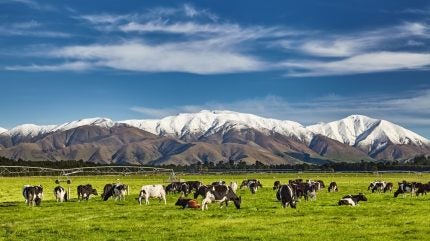
New Zealand has cut its methane emissions targets from agriculture, a move criticised by Greenpeace but welcomed by the local farming group body.
The government of Prime Minister Christopher Luxon announced the reduction in biogenic methane emissions – those generated by meat and dairy livestock – targets yesterday (12 October), setting a new goal by 2050 to achieve cuts of 14-24% from 2017 levels.

Discover B2B Marketing That Performs
Combine business intelligence and editorial excellence to reach engaged professionals across 36 leading media platforms.
It previously sought to lower biogenic methane emissions by 24-47% over the same timeframe. However, a goal to reduce those emissions by 10% by 2030 was left in place using the same 2017 yardstick.
Meanwhile, New Zealand is not moving away from a target to reach net zero in terms of greenhouse gas emissions such as carbon dioxide (CO2) and nitrous oxide, excluding biogenic methane, by 2050.
Campaign group Greenpeace said the new target “amounts to full-blown climate denial”.
Changing Markets Foundation, the NGO environmental advocacy group, suggests methane is a “significant” contributor to global warming (0.5°C based on 2023 data from the Intergovernmental Panel on Climate Change), compared to 0.8°C for CO2.

US Tariffs are shifting - will you react or anticipate?
Don’t let policy changes catch you off guard. Stay proactive with real-time data and expert analysis.
By GlobalDataAmanda Larsson, a climate campaigner at Greenpeace Aotearoa, said in yesterday’s statement that New Zealand’s decision is “truly astounding”.
She added: “Luxon has gone full-on Trump. He’s choosing climate denial and corporate profits over our kids’ future.
“New Zealand is the world’s biggest dairy exporter. If we back down on cutting emissions from our most polluting industry, you can bet other big livestock-producing countries will jump on the bandwagon. That could be game over for the climate.”
Wayne Langford, the president of Federated Farmers of New Zealand, said the backtrack by the government was “long overdue” and represents a “practical step” in the support of farmers.
He said the previous methane emissions target of 24-47% “lacked any credible science to underpin it” and put New Zealand farmers at risk of going out of business.
“Kiwi farmers have been bogged down in completely unscientific, unaffordable and unrealistic climate policy for far too long. At times it’s felt like absolute madness that we’d even be talking about policies that would shut down farms, send production offshore, and completely undermine New Zealand’s economy,” he suggested.
Langford claimed New Zealand’s meat and dairy farmers are the “most climate-friendly” in the world.
He added: “This new target brings New Zealand’s climate policy in line with what the research tells us is actually required to stop Kiwi farmers contributing to further warming.
“A methane tax would have achieved the opposite of its intent – forcing the closure of Kiwi farms, driving production to less efficient countries, and increasing global emissions.”
Under New Zealand’s Climate Change Response Act, the government is obliged to review the 2050 targets every five years to “ensure they are fit for purpose”, the administration confirmed in yesterday’s statement.
A so-called “split-gas” approach has been taken to separate biogenic methane emissions from CO2 emissions. That is because methane emissions are considered a “short-lived greenhouse gas” as opposed to long-lived with CO2, the government said.
The 2050 biogenic methane target will be next reviewed in 2040. Based on current projections, the government said it is confident it can achieve the 2050 goals of net zero greenhouse gases and the 24% cut in methane emissions.
However, it added that “since 2050 is so far in the future, there’s a high degree of uncertainty around these projections”.





